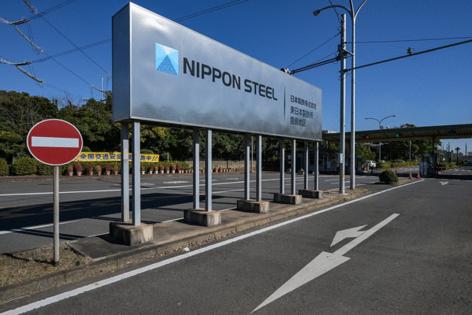Commentary: Trump should reverse Biden's US Steel decision
Published in Political News
Consent of the governed is one of the founding principles of our country. Embedded in the Declaration of Independence, it harks to the frustrations of American colonists over unjust laws and levies placed upon them by the mad king, King George III. Simply put, it is a reaction against the tyranny of centralized government and the ignorance of local popular appeal.
There have been few moments in recent memory when this principle was violated more than Joe Biden, as president, halting the sale of U.S. Steel to Nippon Steel.
On Dec. 23, mayors and municipal leaders of Gary, Indiana, and the Mon Valley in Pennsylvania, whose blast furnaces would have been saved by Nippon, sent a letter to the modern-day mad king, Biden, imploring him not to block the deal, lest their economies crumble.
The folks on the ground told Biden that David McCall, head of the powerful United Steelworkers, was not negotiating in good faith and was pushing misinformation that eventually compelled Biden to block the deal this month.
So, is this truly the end? If you are President Donald Trump, you surely do not want this to be so.
The Mon Valley and Gary Works plants produce, respectfully, 2.9 million and 7.5 million net tons of steel annually. The American Iron and Steel Institute shows 2023’s total steel output for the country at 89.7 million net tons. Thus, if the Mon Valley and Gary plants were to close, this would reduce America’s annual steel output by almost 12%.
Increases in the price of steel caused by this shrinking in supply will be made worse if Trump implements his tariffs. In 2023, the U.S. imported around 28.2 million net tons of steel. Canada and Mexico exported the most to us at a combined 11.1 million net tons.
Without increasing domestic steel production, levying 25% tariffs on Mexico and Canada, as well as 10% to 20% unilateral tariffs on all other countries, any business that depends on steel inputs in the U.S. will be handicapped.
If I am Trump, how am I going to rebuild the military if I have 12% less steel and steeper costs for steel imports than my predecessor? How am I going to super-drive the American economy when these factors are in place?
Trump appeals to working-class voters who feel like they have been left behind. In a sense, he speaks to those who feel Washington has lost its consent to govern. By reversing Biden’s decision, he would speak to the communities that Biden truly turned his back on. Through this sale, he also would have more steel to fulfill his agenda since Nippon’s pledged investments would increase production and keep the Mon Valley and Gary plants operational for decades to come.
Given Trump’s plan of autarky, not reversing Biden’s decision would be a bigger betrayal to the working class than Biden blocking the deal in the first place. Without Nippon acquiring U.S. Steel, workers who thought Trump would lead them into a new golden era will surely be bypassed when they find out they don’t even have enough material to do the things that they are doing now. When they voted for Trump, do you think they consented to this?
____
Vincent Trometter is vice president of Competitive Markets Action Inc. in Washington and a native of Williamsport, Pennsylvania.
___
©2025 Chicago Tribune. Visit at chicagotribune.com. Distributed by Tribune Content Agency, LLC.




























































Comments